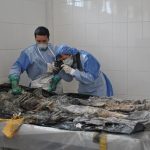Decades of civil war in Colombia gave rise to widespread human rights violations, including mass killings, kidnapping, and torture. In the mid 1960s, violence between Colombia’s Revolutionary Forces of Colombia (FARC) and the National Liberation Army (ELN) groups escalated into the Colombian Armed Conflict. The extended armed conflict developed into a drug war in the 1980s, fueled by the affluent cocaine trade in Colombia.
In 2010, PHR was invited by a Colombian NGO Colombian Interdisciplinary Team for Forensic Work and Psychosocial Assistance (EQUITAS) to assist in investigating human rights abuses by the Colombian government. Two years earlier, 11 men from Soacha, an area outside Bogotá, had been victims of extrajudicial killings. Colombian authorities had identified the men as guerrillas or members of other illegal armed groups and claimed that they were killed in gunfights with the Colombian military.
PHR assisted local human rights and forensic organizations in investigating and documenting the evidence in a number of these so-called “false positive” cases, as well as analysis of autopsies performed on several of the victims. PHR’s investigation revealed that the men in question were in fact kidnapped by Colombian military forces and executed. Obtaining justice for these “false positives” and their families is extraordinarily difficult as the victims’ families are most often poor, uneducated, easily intimidated and without access to social, financial, or legal support.
Despite an historic peace treaty in November 2016 following the decades of violence and mass displacement of civilians, Colombia still has work to do to implement measures to prevent future instances of human rights abuse.

